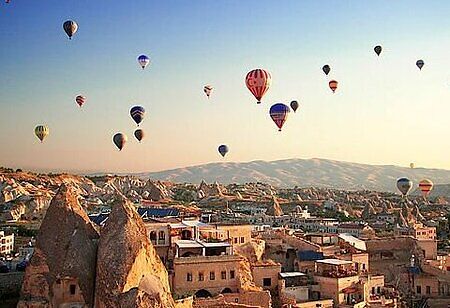
Reviving Tourism in the Middle East


Rich history, incredible food, varied culture, and unlimited entertainment define what it means to take a vacation in the Middle East. Plenty of treats await the souls looking to experience vibrant forms of culture existing in the pyramids and temples of Nile Valley, the sights of Jordan, and shopping around the United Arab Emirates (UAE). Travel and tourism have been the lifeblood of its economy.
Statista forecasts travel and tourism to contribute around $ 486.1 billion by 2028 to the GDP of the Middle East, which is slowly getting back on its feet two years after the COVID-19 pandemic hit the pause button.
Most inhabitants are involved in tourism in one way or another. The tourism industry directly employs many in the form of waiters/waitresses, taxi drivers, guides, or souvenir sellers. There are millions of people tethered to the industry indirectly, like handicraftsmen, Retailers, etc.,
Recovery After COVID-19
According to OECD, tourism contributed 15 percent to Egypt’s GDP, 10 percent to Morocco’s GDP, 12 percent to Tunisia, and 19 percent to Jordan before the pandemic. When the pandemic hit, the distress was amplified by the industries' crucial role in sustaining a large number of informal jobs across these sectors seated in Egypt, Morocco, Tunisia, and Jordan.
This is due to the high role the informal sector plays in these countries' economic and social status to individuals failing to find jobs in formal roles. The informal job market also plays a part in helping reduce the unemployed overspill caused by the pandemic crisis.
Each regional government brewed efforts to reduce the distress caused to the critical sectors. In Morocco, the tourism industry staff received $ 200 a month from the government, given that the employers kept at least 80 percent of their staff. In Jordan, tour companies were freed from various fees and were offered loans.
On the other hand, some countries tried promoting domestic tourism, while others tried appealing to new markets by pushing medical tourism or holidays to eastern Europeans.
Additionally, Moroccan authorities reopened their airports in February. Although Tunisia has already received about a million visitors, the numbers aren’t as close as Morocco’s.
The obstacle in the Ongoing Recovery
There are fears about another wave of COVID, but the more damage that is being done currently is by the Russia-Ukraine war. The Ukrainian and Russian markets are also considered important, as they make up 40 percent of the country’s beach tourists, says Alaa Akel, chairman of the Egyptian Hotels Association. Currently, the Ukrainian tourists have gone, and there’s doubt whether the Russian tourists will return during the summer.
“Even if they [Russians] do return, another problem will arise. Egypt does not accept payment in ruble”, added Mahmoud Radwan, a receptionist at a hotel in the popular Egyptian beach resort town, Hurghada.
Some are hoping for a resolution by this summer to salvage the industry, but others are far less optimistic.
Upon the coming losses, the economic crisis triggered by the Western sanctions on Russia, Bahattin Yucel, a former Turkish economy minister, is concerned that it will affect the Turkish citizen.
Also, some believe that this war, which is doom for some Middle Eastern sectors, could be a boon to others. Wealthy Russians seem to seek a financial haven by pouring money into the real estate of Turkey and the UAE.
The UAE distanced itself from 'discourse of confrontation and polarization' vis-a-vis 'our neighbor Iran,' Anwar Gargash, adviser to the UAE president, tweeted. He said it was part of an approach to building bridges and promoting stability, of which 'Iran is a core part.'
Hoteliers in the region fear that regardless of how quickly the existing problems are solved, they will have to suffer the consequences of this crisis for at least three to four years. However, the pandemic seems to have changed tourists' mindset, and the sector appears to be changing for the better.
Middle Eastern inhabitants are likely to travel domestically.
Finally, Back on Track
A study by YouGov and commissioned by the Ministry of Tourism of Saudi Arabia says that the pandemic profoundly impacts the global tourism sector. It has shown us all, travelers, tourists, businesses, and governments, that we can do things differently.
The study indicates that about 42 percent of tourists globally are either likely or very likely to travel internationally for a holiday. Yet the biggest impact has been on business travel, with 18 percent considering to travel internationally for business purposes.
"Saudi Arabia is a brand new tourism destination. We opened our doors to international tourism just before the pandemic, and because of that, we are willing and able to think and act in new and different ways”, says Ahmed Al-Khateeb, Minister of Tourism, Saudi Arabia.
“By aligning vision, leadership and resources we have been able to create a new model for tourism which is more resilient and more sustainable by design. We look forward to sharing our insights and to working with our international partners to build a brighter future for tourism”, adds the Tourism Minister.
In fact, Saudi has moved up ten places to 33rd in the world overall, recognized by the World Economic Forum in its latest release of the Travel and Tourism Development Index. The index benchmarked 117 countries on 17 pillars crucial to the development and resiliency of their travel and tourism industries. It implies improvements across almost all indicators.